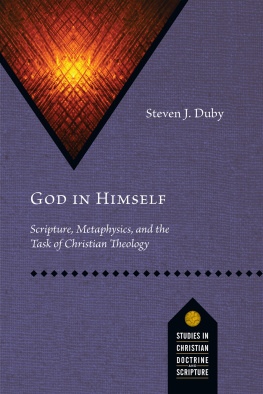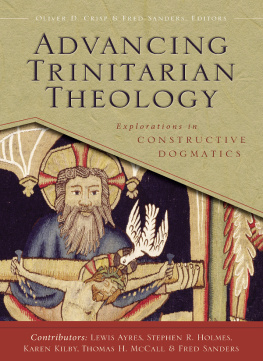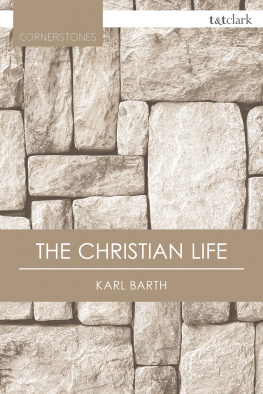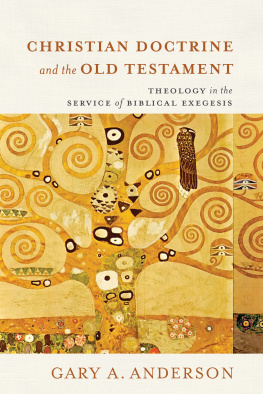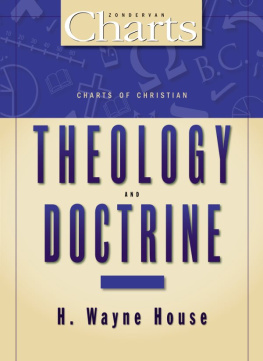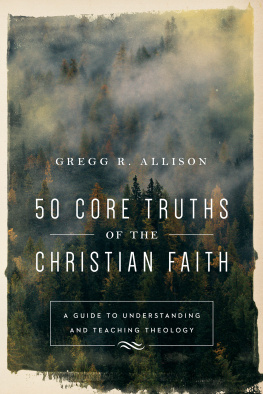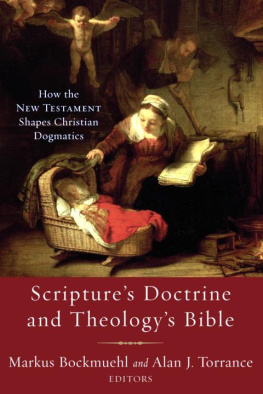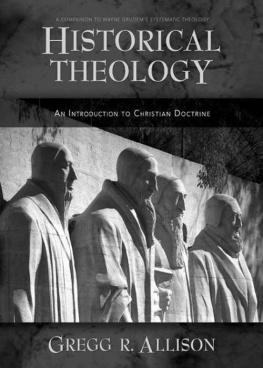Sommaire
Pagination de l'dition papier
Guide
GOD IN HIMSELF
Scripture, Metaphysics, and the
Task of Christian Theology
Steven J. Duby
InterVarsity Press
P.O. Box 1400, Downers Grove, IL 60515-1426
ivpress.com
email@ivpress.com
2019 by Steven J. Duby
All rights reserved. No part of this book may be reproduced in any form without written permission from InterVarsity Press.
InterVarsity Press is the book-publishing division of InterVarsity Christian Fellowship/USA, a movement of students and faculty active on campus at hundreds of universities, colleges, and schools of nursing in the United States of America, and a member movement of the International Fellowship of Evangelical Students. For information about local and regional activities, visit intervarsity.org.
Scripture quotations, unless otherwise noted, are the authors translation.
Cover design: David Fassett
Interior design: Beth McGill
Images: Apexphotos / Moment Collection / Getty Images
ISBN 978-0-8308-4374-9 (digital)
ISBN 978-0-8308-4884-3 (print)
This digital document has been produced by Nord Compo.
For Ivor Davidson, theologian and mentor
of the highest order
Acknowledgments
T HIS BOOK HAS BEEN HELPED ALONG in different ways by a number of people. I am grateful to Dan Treier and Kevin Vanhoozer for granting me the opportunity to contribute to this series and for their patience, encouragement, and insight throughout the process. I am grateful to John Webster for his feedback and encouragement on the idea shortly before his death. Matthew Leverings wisdom and incessant kindness also have been tremendously valuable to me. David McNutts work as an editor has been a great help in the publication process.
In the summer of 2018, I completed a research fellowship at Calvin Colleges H. Henry Meeter Center for Calvin Studies, where I spent many enjoyable hours reading and writing. I am grateful to Professor Karin Maag and those working with her at the Meeter Center for access to the library and for their hospitality.
My wife, Jodi, and our children (Charlie, Evangeline, Wyatt, George) provide constant reminders of the goodness of God. I am thankful for the ways in which they prod me to relate academic theology to the Christian life.
Finally, Ivor Davidsons rare combination of erudition and genuine humility, scholarly rigor and Christian faithfulness, continue to inspire not only me but also many others in their theological work. This book is dedicated to him.
Series Introduction
Studies in Christian Doctrine and Scripture (SCDS)
DANIEL J. TREIER AND KEVIN J. VANHOOZER
T HE STUDIES IN CHRISTIAN DOCTRINE and Scripture (SCDS) series attempts to reconcile two disciplines that should never have been divided: the study of Christian Scripture and the study of Christian doctrine. Old walls of disciplinary hostility are beginning to come down, a development that we hope will better serve the church. To that end, books in this series affirm the supreme authority of Scripture, seeking to read it faithfully and creatively as they develop fresh articulations of Christian doctrine. This agenda can be spelled out further in five claims.
1. We aim to publish constructive contributions to systematic theology rather than merely descriptive rehearsals of biblical theology, historical retrievals of classic or contemporary theologians, or hermeneutical reflections on theological methodvolumes that are plentifully and expertly published elsewhere.
The initial impetus for the SCDS series came from supervising evangelical graduate students and seeking to encourage their pursuit of constructive theological projects shaped by the supremacy of Scripture. Existing publication venues demonstrate how rarely biblical scholars and systematic theologians trespass into each others fields. Synthetic treatments of biblical theology garner publication in monograph series for biblical studies or evangelical biblical theology. A notable example is a companion series from IVP Academic, New Studies in Biblical Theology. Many of its volumes have theological significance, yet most are written by biblical scholars. Meanwhile, historical retrievals of theological figures garner publication in monograph series for historical and systematic theology. For instance, there have been entire series devoted to figures such as Karl Barth or the patristic era, and even series named for systematic theology tend to contain figure-oriented monographs.
The reason for providing an alternative publication venue is not to denigrate these valuable enterprises. Instead, the rationale for encouraging constructively evangelical projects is twofold and practical: The church needs such projects, and they form the theologians undertaking them. The church needs such projects, both addressing new challenges for her life in the world (such as contemporary political theology) and retrieving neglected concepts (such as the classic doctrine of God) in fresh ways. The church also needs her theologians not merely to develop detailed intellectual skills but also ultimately to wrestle with the whole counsel of God in the Scriptures.
2. We aim to promote evangelical contributions, neither retreating from broader dialogue into a narrow version of this identity on the one hand, nor running away from the biblical preoccupation of our heritage on the other hand.
In our initial volume, Theology and the Mirror of Scripture, we articulate this pursuit of evangelical renewal. We take up the well-known metaphor of mere Christianity as a hallway, with particular church traditions as the rooms in a house. Many people believe that the evangelical hallway is crumbling, an impression that current events only exacerbate. Our inspection highlights a few fragmenting factors such as more robust academic engagement, increased awareness of the Great Christian Tradition and the variety of evangelical subtraditions, interest in global Christianity, and interfaces with emergent Christianity and culture. Looking more deeply, we find historical-theological debates about the very definition of evangelical and whether it reflectsstill, or evera shared gospel, a shared doctrine of God, and a theological method that can operationalize our shared commitment to Scriptures authority.
In response, prompted by James 1:22-25, our proposal develops the metaphor of a mirror for clarifying evangelical theologys relation to Scripture. The reality behind the mirror is the gospel of God and the God of the gospel: what is revealed in Christ. In disputes about whether to focus on a center or boundaries, it may seem as if evangelicalism has no doctrinal core. But we propose treating what is revealed in Christthe triune God and the cross of Christ, viewed in the mirror of Scriptureas an evangelical anchor, a center with a certain range of motion. Still, it may seem as if evangelicalism has no hermeneutical coherence, as if interpretive anarchy nullifies biblical authority. But we propose treating Scripture as canonical testimony, a God-given mirror of truth that enables the church to reflect the wisdom that is in Christ. The holistic and contextual character of such wisdom gives theology a dialogic character, which requires an evangelical account of the churchs catholicity. We need the wisdom to know the difference between church-destroying heresy, church-dividing disagreements that still permit evangelical fellowship, and intrachurch differences that require mutual admonition as well as forbearance.

